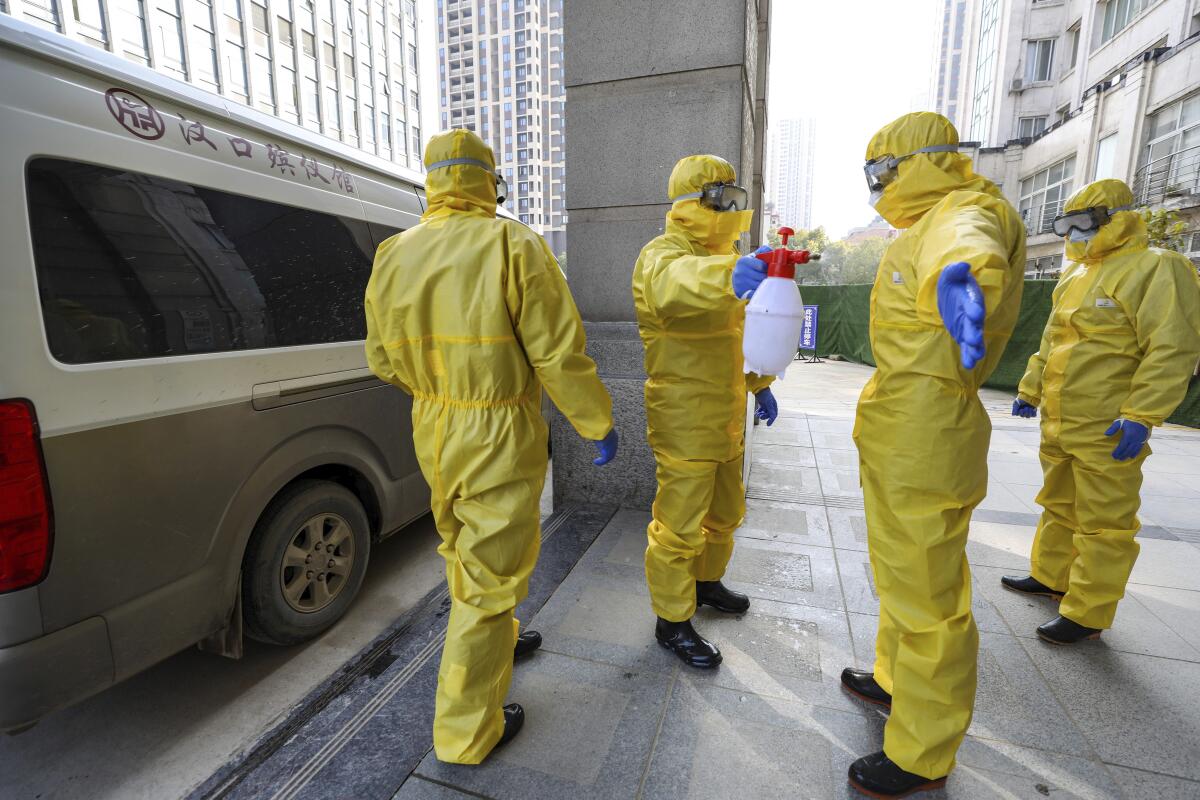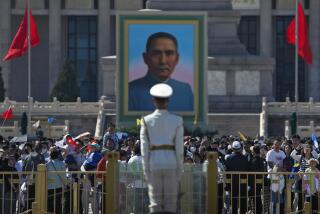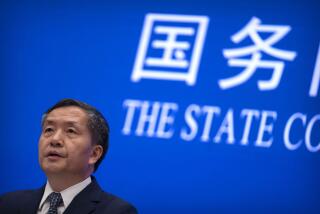Chinese demand freedom of speech and honesty after whistleblower in coronavirus fight dies

- Share via
BEIJING — Twenty-four hours after the death of the doctor who’d been arrested for warning people about the impending coronavirus epidemic, the sound of whistles, loud and clear, pierced the night’s darkness in the locked-down city of Wuhan.
And as lights flickered from apartment windows filled with quarantined residents, the sounds of “Remembrance,” a well-known song commemorating the thousands who died in the 2008 Sichuan earthquake, rang out.
The sights and sounds of the impromptu tribute to the whistleblower, Dr. Li Wenliang, were captured in a video posted online by a Wuhan woman who attached a message:
“Doctor Li, did you hear? It was your warning, letting us know to ask those around us to wear a mask. Thank you for your protection...We will always remember... “
She added a hashtag: “Farewell to the whistleblower.”
Then government censors deleted her video.
The doctor’s death from the virus, announced early Friday, has sparked cries for freedom of speech across China, as well as fury and demands for more government accountability.
On Friday, a group of scholars from prominent universities issued an open letter to the National People’s Congress, demanding immediate implementation of China’s constitutional guarantee of the freedom of speech.
“Where there is no free speech, there is no safety,” they wrote, calling the outbreak a “humanitarian disaster” that was leaving China in “unprecedented global isolation” while authorities continued to focus more on silencing critics than on controlling the virus’ spread.
More than 37,000 people have been reported infected and over 800 have died in mainland China, including a 60-year-old U.S. citizen who succumbed Wednesday in Wuhan.
As the toll mounts, Beijing has tried to control the narrative, sending 300 propaganda writers from state media to Wuhan to produce upbeat stories about China’s virus response and mobilizing untold others to delete questions, criticisms and cries for help online. Activists seeking to investigate the crisis’ scale have been detained by police.
“Trust the Communist Party’s leadership,” officials repeat.
Many Chinese are no longer listening.
In the hours after Li’s death was officially confirmed Friday morning, millions of comments flooded social media, many accusing the government of concealing information, resulting in the deaths of Li and others. “I want freedom of speech” trended for hours before censors scrubbed the topic.
Social media users said Li was a “regular person” who had not sought to be a hero, and was detained simply for warning colleagues and friends within a private chat group about a new virus. Critics reflected online how authorities prioritized political “stability” over reality.
“We’ve become deformed without realizing, disciplined to the point where we don’t react like regular people,” wrote a blogger surnamed Chen. “When you get a message about something that could risk millions of people’s lives, your first thought is not, ‘How can I warn everyone?’ but ‘Will I be in danger for speaking?’”
“In the past, I didn’t understand why we had to study so many Lu Xun essays, or what kind of society is one where man eats man,” wrote another user surnamed Liu, referencing the Chinese revolutionary writer famous for depicting China as a numbed society where humanity is devoured by power and apathy.
“Half a year ago, I also didn’t understand, why did the ‘useless youth’ in Hong Kong say that we are living in a made-up beautiful dream, unable to hear the sounds from outside?” she wrote. “Now I understand it all.”
Another user wrote: “You government officials and hospital leaders, red-faced over public opinion — you’re the ones who are the disease.”
In Wuhan, dozens of citizens ventured out Friday and Saturday to the hospital where Li died, leaving bouquets of flowers in his honor.
One included a handwritten message: “The ophthalmologist couldn’t cure the world’s blindness. If there is another life, give up medicine and take up literature to open the people’s minds,” referencing Lu Xun’s decision to leave medicine and become a writer in hopes of rousing Chinese people to rise up against the Qing Dynasty.
It was signed, “From a free citizen.”
Two newspapers ran front-page stories demanding accountability for Li’s demise. “Let the sunlight of openness and transparency pierce through the haze of the virus,” read a headline in Shanghai’s Xinmin Evening News.
“Please clear the name of the ‘rumormonger,’” read the front page of Beijing’s Economic Observer.
Beijing announced Friday that the Communist Party was sending an inspection team to Wuhan to “thoroughly investigate issues related to Dr. Li.” Chinese media reported that Wuhan’s local government would consider Li’s death a work-related injury and provide roughly $117,000 to his family.
Wuhan’s city government issued a statement expressing “sadness and respect” for the doctor’s death without apology.
But such measures have not quelled public anger.
Gao Fei, a migrant worker in Hubei province who was detained for seven days because he wrote a tweet criticizing President Xi Jinping’s refusal to admit China’s need for outside help, said in a phone interview that he had met two others in prison detained for posting information about overwhelmed hospitals and lack of medical supplies in Hubei.
He feared that the outbreak was getting worse in Hubei, and that authorities were arbitrarily using quarantine orders to detain those who speak up.
“We are all hiding at home. We eat, drink and wait to die,” Gao said. “We hope for international pressure and for Chinese people to fight for freedom of speech and push this government to do something.”
“This has touched the bottom line of Chinese people’s existence,” said sociologist Guo Yuhua at Tsinghua University in Beijing. “A lot of people think, as long as I can eat and stay warm, who cares about freedom or democracy? But now you know.”
“It’s not just the virus, but a political type of virus,” she said.
At the same time, China’s so-called stability maintenance apparatus — police, jails, censorship, propaganda — is so strong, she said, that institutional change is unlikely any time soon.
“To cover up earlier wrongs, they do new wrongs. To cover the old lies, they tell new lies,” she said.
Li, the doctor, is one of many who have died while seeking to combat the disease on the front lines. On Feb. 3, He Hui, 54, died in Wuhan, infected with coronavirus after volunteering as a driver to ferry people to and from hospitals amid a transportation lockdown.
“There’s this pain in my heart. I can’t put it into words. It’s not sadness, it’s pain,” said Qi, a friend and former colleague of He’s who did not give his full name.
Qi said in a phone interview from Wuhan that He had been a successful businessman with a large family and newborn grandchild. In the end, He was the victim of an inept system, Qi said.
“Why did they need volunteers to drive and pick up doctors? When authorities decided to restrict transportation, didn’t they think that medical staff would need to go to work?” he said. “
“It’s not about how great any individual is,” he said. “The problem is in our society, this failed structure and chaotic management that have created a man-made disaster ...it’s killing people.”
Gaochao Zhang and Nicole Liu in The Times’ Beijing bureau contributed to this report.
More to Read
Sign up for Essential California
The most important California stories and recommendations in your inbox every morning.
You may occasionally receive promotional content from the Los Angeles Times.











